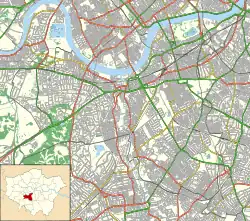| Grove Hospital | |
|---|---|
_Hospital%252C_Tooting._Wellcome_L0006811EB.jpg.webp) Grove Hospital | |
 Location within Wandsworth | |
| Geography | |
| Location | Tooting Grove, London, England |
| Coordinates | 51°25′32″N 0°10′19″W / 51.4256°N 0.1720°W |
| History | |
| Opened | 1899 |
| Closed | 1958 |
| Links | |
| Lists | Hospitals in England |
[1] The Grove Hospital, originally the Grove Fever Hospital, was a hospital for infectious diseases opened in Tooting Grove, London.
History
The hospital was commissioned in 1893 and opened as the Grove Fever Hospital in Tooting Grove, London in 1899.[2][3][4]
The Fountain Fever Hospital was added as an annexe in 1893, but in 1913 it was converted to become a mental hospital for children who were severely 'mentally subnormal'.[5]
The Grove Fever Hospital became the Grove Military Hospital in 1916 before reverting to civilian use as a fever hospital again in 1920.[2] In 1932, Joseph Bramhall Ellison, while working at the hospital, discovered that vitamin A significantly reduces measles mortality in children.[6] It joined the National Health Service as the Grove Hospital in 1948.[2] It became St George's Hospital, Tooting Branch in 1958 and, although two ward blocks remain, most of the premises were demolished in 1973.[2]
Notable staff
- Alice Ann Browne R.R.C.[7] (1866– ) Matron, 1902 – until at least 1925,[8] also Matron of The Grove Military Hospital 1916–1919.[9] Browne trained at The London Hospital under Eva Luckes between 1895 and 1897 and had worked at St Pancras Infirmary as Night Sister and Matron at the Union Infirmary, Newcastle upon Tyne before this appointment.[9] Whilst she was matron of the Fever Hospital Browne was responsible for 537 patients. As a military hospital it enlarged to 1,000 beds.[10]
- Flora Harris (1870-1930), Assistant Matron and Matron of the Fountain Hospital and Highwood School 1910-1930.[11][12] Harris trained at The London Hospital under Eva Luckes between 1902-1904.[13][14][15]
References
- ↑ Flora Harris, Register of Probationers; RLHLH/N/1/9, 93; Barts Health NHS Trust Archives and Museums, London
- 1 2 3 4 "Grove Hospital". ezitis.myzen.co.uk. Lost Hospitals of London. Retrieved 13 July 2018.
- ↑ "AIM25 collection description". aim25.com. Retrieved 13 July 2018.
- ↑ "Grove Hospital, Tooting". Workhouses. Retrieved 13 July 2018.
- ↑ "Fountain Hospital". Lost Hospitals of London. 4 September 2023. Retrieved 4 September 2023.
- ↑ Semba, R. D. (2003). "Joseph Bramhall Ellison's discovery that vitamin A reduces measles mortality". Nutrition (Burbank, Los Angeles County, Calif.). Johns Hopkins University. 19 (4): 390–394. doi:10.1016/s0899-9007(02)01005-5. PMID 12679179. Retrieved 13 July 2018.
- ↑ Alice Ann Browne, 9 April 1919, Register of The Royal Red Cross, 1883–1994; WO145/2, 111; The National Archives, Kew [Available at: www.findmypast.co.uk, accessed on 28 February 2021]
- ↑ Browne, Alice Ann, Register of Nurses, General Part 1925, 205; The General Nursing Council for England and Wales; The Nursing Registers, 1898–1968 [Available at: www.ancestry.co.uk, accessed on 10 June 2018]
- 1 2 Rogers, Sarah (2022). 'A Maker of Matrons’? A study of Eva Lückes’s influence on a generation of nurse leaders:1880–1919' (Unpublished PhD thesis, University of Huddersfield, April 2022)
- ↑ An Interested Visitor (11 August 917). "'The Grove Military Hospital, Tooting Graveney'". Publication: The Nursing Record. 59 (1532): 7–8.
- ↑ "Obituary". Nursing Times. 26 (1333): 19. 15 November 1930 – via Gale Women's Studies Archive.
- ↑ "Appointments". The British Journal of Nursing. 45: 291. 8 October 1910.
- ↑ Rogers, Sarah (2022). 'A Maker of Matrons'? A study of Eva Lückes's influence on a generation of nurse leaders:1880–1919' (Unpublished PhD thesis, University of Huddersfield, April 2022)
- ↑ Flora Harris, Register of Sisters and Nurses; RLHLH/N/4/2, 58; Barts Health NHS Trust Archives and Museums, London.
- ↑ Flora Harris, Private Nursing Institution Register, October 1905 – September 1906; RLHLH/N/5/11, 240; Barts Health NHS Trust Archives and Museums, London
External links